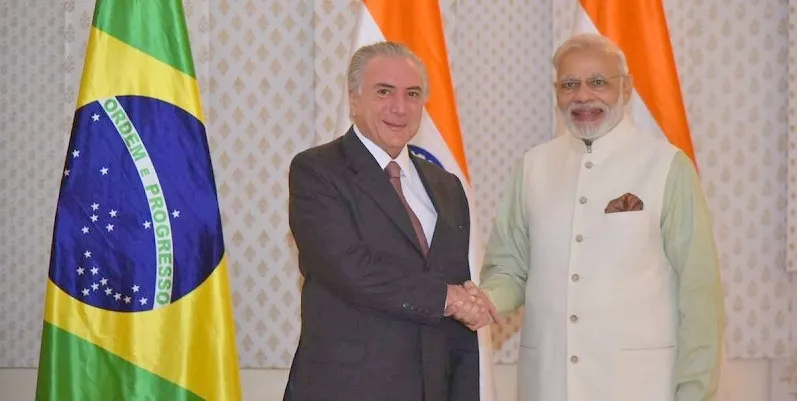[BRICS Summit] Brazil to help India's entry into NSG, finalises bilateral investment deal
Seeking to scale up their economic engagement, India and Brazil recently finalised the text of a bilateral investment deal and decided to expand overall ties even as the two countries sought united global action without "distinction" or "discrimination" to deal with terrorism.

After holding wide-ranging talks with Brazilian President Michel Temer, Prime Minister Narendra Modi said India deeply appreciated Brazil's support to its actions in combating terror, noting both countries will work for early adoption of the Comprehensive Convention Against International Terrorism (CCIT) by the UN. In the talks, Temer supported New Delhi's bid for membership of the Nuclear Suppliers Group and conveyed to Modi that Brazil will work with other member countries of the elite bloc to facilitate India's entry into it.
In a statement to the media after the talks, Modi said,
Both countries have finalised the text of the bilateral investment agreement, which will provide "much needed momentum" to increased bilateral business and investment linkages.
Modi said he has sought greater market access and investment opportunities for Indian products and companies in Brazil and was "thankful" for Temer's "positive consideration". Temer was here to attend the annual summit of BRICS which took place yesterday. It is his first bilateral visit outside Latin America after assuming charge of the high office in August.
President Temer and I have reviewed the full range of bilateral cooperation. Noting the potential for much more, we have agreed to scale up our engagement. This is in line with our mutual desire for a reinforced strategic partnership," Modi said in presence of Temer.
On NSG issue, Modi thanked Brazil for understanding India's aspiration for membership of the group. Referring to the threat of terrorism, Modi said,
We deeply appreciate Brazil's support for India's actions in combating terrorism. We agreed that the world must come together to fight this menace without distinction or discrimination
Talking about Brazil's priority to reviving the domestic economy, Modi said India can be a valuable partner in it.
I welcome Brazilian companies to come and invest in India and to forge long-term commercial partnerships, he said.
The two leaders met a group of CEOs of top companies from both countries to explore ways to deepen economic engagement.
We have also made progress in opening new areas of cooperation during this visit in drug regulation, agricultural research and on cyber security issues. President Temer and I also agreed to intensify and strengthen our coordination in important international fora. There is much that is common in our approach and positions. We will work closely at the United Nations, the G-20, G-4, WTO, BRICS, IBSA and other important platforms, Modi said.
Brazil further added that it will work with member countries of Nuclear Suppliers Group (NSG) to facilitate India's entry in the elite grouping that controls global trade in the atomic field, according to the External Affairs Ministry. This assumes significance since NSG is slated to meet in about a month in Vienna.
Also read : [BRICS Summit] India one of the most open economies today: Narendra Modi
At the Seoul meet of NSG in June, Brazil did not oppose India's entry into the club, but had called for common criteria for countries that have not signed the Non-Proliferation Treaty.


![[BRICS Summit] Brazil to help India's entry into NSG, finalises bilateral investment deal](https://images.yourstory.com/cs/wordpress/2016/10/Cu8nR4MUIAAt-Mg.jpg?mode=crop&crop=faces&ar=16%3A9&format=auto&w=1920&q=75)




